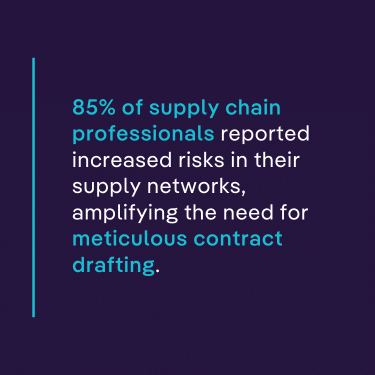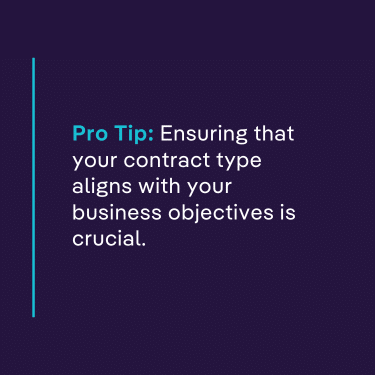Published: January 17, 2023
Updated: December 5, 2024
Why Manufacturing Contracts Are Critical

Manufacturing contracts are the backbone of any successful partnership between businesses and manufacturers. These legally binding agreements define the scope of work, establish clear expectations, and mitigate risks associated with production. The stakes are particularly high in today’s business environment, where supply chain disruptions—highlighted by recent global events—have underscored the importance of robust contractual frameworks.
According to a McKinsey survey, 85% of supply chain professionals reported increased risks in their supply networks, amplifying the need for meticulous contract drafting.
In this guide, we’ll break down the essentials of manufacturing contracts, highlight key clauses, and explore how technology, including ContractPodAi, can streamline these processes.
1. Types of Manufacturing Contracts
A thorough understanding of manufacturing contracts is essential for tailoring agreements to specific business needs. Here’s a breakdown of the main types:
| Contract Type | Purpose | Key Clauses | Typical Use |
|---|---|---|---|
| Contract Manufacturing Agreement | Terms for producing goods. | Payment Terms, Quality Control | Businesses hiring manufacturers to produce custom goods. |
| Manufacturing Service Agreement | Defines manufacturing-related services (e.g., consulting, R&D). | Service Scope, Confidentiality | Engaged for consulting or equipment usage. |
| Subcontractor Manufacturing Agreement | Outlines responsibilities when work is outsourced to subcontractors. | Subcontractor Obligations, Quality Control | When third parties handle production components. |
| Supply Chain Agreement | Comprehensive coverage for supply chain management. | Risk Allocation, Delivery Terms | Managing supplier relationships and logistics. |
| Original Equipment Manufacturer (OEM) Agreement | Manufacturer produces goods to company specifications. | Intellectual Property, Licensing Terms | Used when a company outsources product production but retains control over branding and distribution. |
| Original Design Manufacturing (ODM) Agreement | Manufacturer designs and produces goods for rebranding. | Ownership Rights, Product Development | Ideal for companies wanting to brand products designed by the manufacturer. |
| Turnkey Manufacturing Agreement | Manufacturer handles the entire production process. | Ownership, Timeline, Delivery Specifications | For businesses outsourcing all manufacturing aspects. |
| Electronic Contract Manufacturing Agreement | Manufacturer produces electronic components or devices. | Quality Standards, Confidentiality | Popular in technology and electronics industries. |
| White Label Manufacturing Agreement | Produces generic goods sold under a retailer’s brand. | Rebranding Rights, Quality Standards | Retailers seeking quick branding solutions for generic products. |
| Private Label Manufacturing Agreement | Produces goods exclusively for a specific brand. | Exclusivity, Product Specifications | Used by brands wanting unique products. |
| Private Label Supply Agreement | Governs the supply of goods for exclusive branding by the buyer. | Supply Terms, Exclusivity | For retailers who want products manufactured under their private label. |
| Distribution Agreement | Governs the distribution of products to customers. | Territory, Pricing, Marketing Responsibilities | Used by manufacturers to define terms with distributors. |
| Value-Added Reseller (VAR) Agreement | Allows resellers to add value to a product before selling it. | Licensing, Modification Rights | Common in software, electronics, and technology industries. |
| Textile Manufacturing Agreement | Terms for producing textiles or apparel. | Design Approvals, Production Volume | Common in the fashion and apparel industry. |
| Pharmaceutical Manufacturing Agreement | Produces drugs and medical products under strict regulations. | Compliance, Safety Standards | Used by pharmaceutical companies to ensure regulatory adherence. |
| Food Manufacturing Agreement | Covers production and packaging of food products. | Food Safety, Labeling Requirements | Used in the food industry for safe and consistent production. |
| Component Manufacturing Agreement | Focuses on producing specific parts or components. | Design Specifications, Warranty Terms | For companies assembling final products from outsourced components. |
| Custom Product Development Agreement | Covers development and manufacturing of tailored products. | Ownership, Development Scope | For businesses creating unique products requiring R&D and manufacturing. |

Pro Tip: Ensuring that your contract type aligns with your business objectives is crucial. For instance, a case study on subcontracting management in an EPC project revealed that well-drafted subcontractor agreements can significantly reduce production delays, with some projects experiencing delays of more than 30% due to inadequate subcontracting practices.
2. Key Clauses in Manufacturing Contracts
To build an effective manufacturing contract, the following clauses are non-negotiable:
- Intellectual Property Rights: Protects the ownership of designs, patents, and proprietary processes
- Confidentiality Clauses: Safeguards sensitive business information
- Quality Control and Product Specifications: Ensures consistency in product quality
- Delivery Terms and Payment Schedules: Specifies payment terms and delivery milestones
- Termination and Renewal Clauses: Defines how the contract can end or be extended
AI in Negotiations: Tools like Leah simplify the negotiation of these clauses by automating analysis, ensuring compliance, and highlighting areas for optimization.
3. Legal Considerations
Navigating the legal landscape is critical to avoiding costly disputes. Expand your contracts with:
- Regulations for International Manufacturing: Address import/export laws and tariffs
- Compliance with Local Manufacturing Laws: Ensure adherence to labor laws and safety standards
- Avoiding Legal Disputes: Clearly outline dispute resolution mechanisms such as arbitration clauses
4. Contract Negotiation Tips
Effective negotiation is key to securing favorable terms. Here are best practices:
- Research and Prepare: Understand the manufacturer’s needs and limitations
- Prioritize Key Terms: Focus on clauses most critical to your business objectives
- Leverage Digital Tools: AI platforms like ContractPodAi enhance efficiency by analyzing negotiation outcomes in real-time
Set Your Business Up for Success
A well-constructed manufacturing contract can be the difference between a thriving business partnership and costly disputes. According to Baker McKenzie’s 2024 Global Disputes Forecast, 89% of respondents in the Industrials, Manufacturing & Transportation sector expect disputes volumes to stay the same or increase in 2025, underscoring the importance of robust contract management to mitigate potential conflicts. Whether you’re negotiating a subcontractor agreement or drafting a supply chain agreement, leveraging the right tools and expertise is essential.
Ready to transform your contract management process? Book a demo today.








